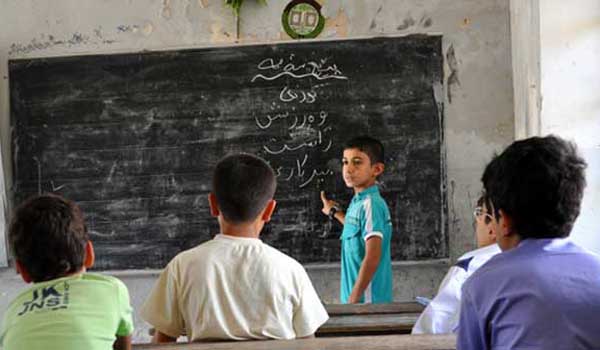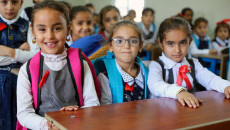The Iraqi parliament refused to transfer the services and payroll of cadres of the Kurdish education department in the disputed territories to the federal government instead of the Kurdish Regional Government, and thus the process stopped until 2026.
At dawn on Monday, June 12, the Iraqi parliament approved the general budget bill for the years (2023, 2024 and 2025) and rejected by a majority of votes the transfer of Kurdish study salaries in the disputed territories to Baghdad.
Najwa Kaka’i, a Kurdish member of the Iraqi parliament, told KirkukNow, “The rejection of this section of the bill means that this issue will not be discussed in parliament until 2026, because the budget that was approved is for three years.”
She pointed out that "the Kurdish blocs were supporting this step. The issue has been discussed at the level of the Ministry of Education of the Kurdistan Regional Government KRG and the Federal Ministry of Education for months, but unfortunately it was rejected by Parliament due to the opposition of the Arab blocs."
According to the statistics of the KRG Ministry of Education, there are 14,000 teachers and employees on the staff of the ministry, whom serve in the schools of the governorates of Kirkuk, Nineveh, Diyala and Salah al-Din.
Kurdish education unit in Kirkuk paid by the KRG are 7,751 teachers and employees teaching Kurdish curriculum to 100,000 pupils in 500 schools. The main language for education in Iraq is Arabic while in the three provinces of the Iraqi Kurdistan Region IKR it’s in Kurdish.
The KRG has opened special directorates for Kurdish education in the disputed territories of Kirkuk, Nineveh and Diyala which alike its Kurdish counterparts suffer lack of budget for accurate monthly payroll and shortage of staff, curriculums and utilities.
The oil rich city of Kirkuk, Iraq's second largest oil reserves, is ethnically a mixed province for 1.7 million Kurds, Sunni and Shiite Arabs, and Turkmen. It has long been at the center of disputes between Baghdad and the autonomous Kurdistan Regional Government KRG.
The ministerial curriculum of the current Iraqi government headed by Muhammad Shia’a al-Sudani includes (paragraph 21- page 25) on “linking all Kurdish study schools that are located outside the Kurdistan Region to the General Directorate of Kurdish Studies in the Federal Ministry of Education and transferring its staff to this department.”
Sherzad Rashid, director of Kurdish studies in Kirkuk province, told KirkukNow, “Yes, the file was part of the ministerial curriculum of the government of Muhammad Shia al-Sudani, within the framework of the Kurdistan Regional Government’s demands to form a government, but the issue was then linked to the approval of the budget, and it was one of the It is required to vote on it in the budget law.
What happened was unfair for these teachers and employees
"What happened was unfair for these teachers and employees because they serve in Kirkuk, Mosul, Diyala and Salah al-Din, and their curricula belong to the Iraqi government, but their staff is under the regional government."
Sherzad, who was at the same time a member of the joint committee formed between the Ministries of Education of the Erbil and Baghdad for this purpose, said, "Now we will continue as before, and our salaries will remain on the Kurdistan Regional Government, but our curricula belong to the Iraqi government."
The salaries of federal government employees are distributed on time, unlike the KRG, whose disbursement is often delayed. A retiree in the Iraqi government has 42 years of service. His salary is estimated 1.5 million Iraqi Dinars IQD ($1,000), in addition to the cost-of-living allowances that amount to 300 IQD.
In addition to that, the end-of-service reward for a pensioner is 30 million IQD, while a person who has the same years of service in the KRG, receives a retirement salary of 900,000 IQD and an end-of-service reward up to 10 million IQD.
The KRG has been unable to pay the full salaries of its employees since 2014, on the grounds of the financial crisis.
Thousands of Kurdish teachers of Kurdish education in Kirkuk have staged dozens of protests over the past nine years demanding that their services be transferred to Baghdad.
Kurds in Kirkuk were happy for educating their kids their native language. The process was funded by the KRG which employed over 8,000 teachers which lamed in 2014 for irregular payment of monthly salaries and funding.
The tension between Baghdad and Erbil in 2017 had a negative impact on Kurdish education process in Kirkuk as the KRG was incapable of providing regular funding pushing the tutors for boycott and protest for several times.






